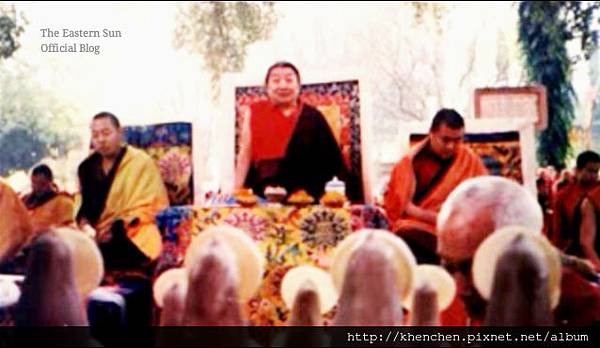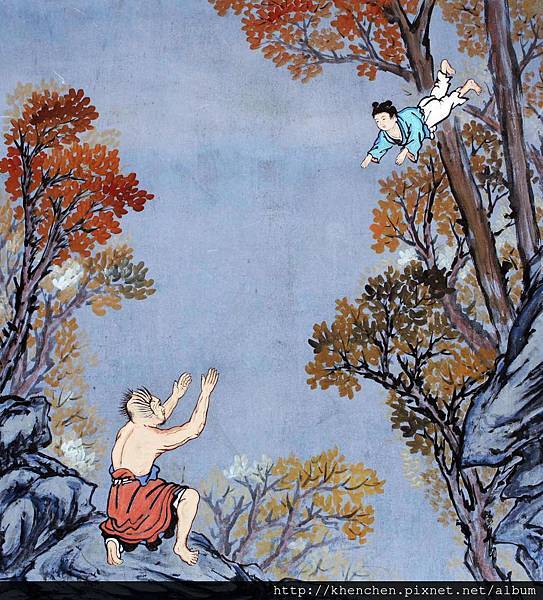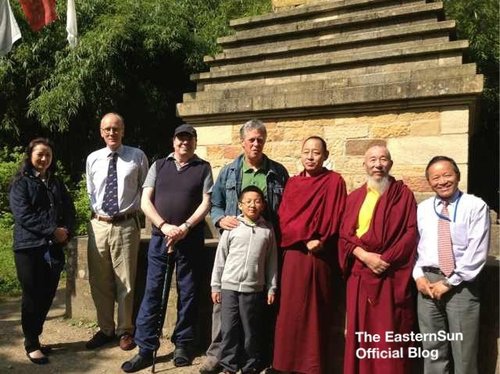

屹立於後,能支撐吾人繼續努力堅持的靠山是 :「 信念」 !
................
敏林堪千仁波切與您分享 :
信念│Faith
信念是挑戰邏輯的。
具信念者,方能正面思考、方會相信有位慈愛的佛陀深切關懷我們的苦痛。相信於生命中、於宇宙裡、或是歷經無數失敗後的自我仍深具勇氣。
信念是勇氣的展現。
那是每日晨起時,選擇面對自我的恐懼,並相信佛陀會幫助我們。
信念是選擇相信 : 下次我們可以獲得成功 !
儘管先前已然失敗百次 。
.........
⊙ 關於信念或信心,往往於現實生活中,是和世間的邏輯不相符的。當您追求自己的理想時,甚或修習於菩提道上,許多對境的發生,往往衝擊了我們的心。密勒日巴與馬爾巴師徒間的故事膾炙人口,然而,倘若發生在自身上,自己是否依然能持守信念呢 ? 日日祈請卻沒有任何好事發生,甚或周遭的親友眷屬不以為然時,是否ㄧ如既往的默默精進與持守善念、信念 ?
信念,是挑戰邏輯的;信念,是寶貴的力量 。這是敏林堪千仁波切提醒您,與您的分享。
.......................................
⊙烏金淨土 --印度 敏卓林寺

信念與智識│ Faith and Intellect
龍樹菩薩闡明信念與智識是心靈成長的兩大重要要素,其中又以信念為其關鍵。
龍樹菩薩清楚提及,我們需要智慧,藉此能力以明辨正道,繼而培養深刻的洞察力,如此方能有足夠的力量驅使心靈成長。
然而理解不應只停留於智識與理性的階段,而應將其融入自心及精神,如斯方能直接影響作為。
否則吾人於佛法上的學習將單只止於智識層面,相對於態度、行為及生活方式則毫無實效與具義。
─ 敏林堪千仁波切 | http://khenchen.pixnet.net/blog/post/11893510
................... (( 關於信念 --
不爲利養、名聞、財寶、轉輪聖王、四大天王、釋提桓因、大梵天王人天中樂,唯願利益一切衆生 ... ))
每次讀來,感動滿滿的故事 --雪山半偈

「願令一切慳惜之人,悉來見我捨離此身。若有少施起貢高者,亦令得見我,爲一偈捨此身命,如棄草木。」

釋尊於因地為凡夫時,有一世入雪山修持菩薩行,名為雪山大士或雪山童子。
其終日食果坐禪。天帝釋為試其道心,化作羅剎,故誦過去諸佛所說半偈:“諸行無常,是生滅法。”
大士聞之歡喜,求說餘半偈,羅剎言:“我今飢逼,實不能說。”
大士問其以何為食,羅剎答言唯食人之暖肉熱血。
大士聞言,斷然宣布:“但能具足說是偈竟,我當以身奉施供養!”
即脫鹿皮衣為羅剎敷座,
羅剎於是宣說下半偈:「生滅滅已,寂滅為樂。」
大士深思其義,書偈於石壁、樹上,然後登樹。
如是偈句,乃是過去、未來、現在諸佛所説開空法道。釋尊爲此法,棄捨身命,不爲利養、名聞、財寶、轉輪聖王、四大天王、釋提桓因、大梵天王人天中樂,爲欲利益一切衆生,故捨此身。
故而大士復云:
「願令一切慳惜之人,悉來見我捨離此身。若有少施起貢高者,亦令得見我,爲一偈捨此身命,如棄草木。」
大士投身於地,其時羅剎還復為帝釋身,接住大士,安置平地,懺悔頂禮而去。
大士因此為半偈捨身因緣,超十二劫成佛。
--《涅槃經·聖行品》
...............
半偈指「諸行無常,是生滅法;生滅滅已,寂滅為樂」一偈之後半偈。
據北本《大般涅槃經》卷十四謂,釋迦如來於過去世為凡夫時,入雪山修菩薩行,從帝釋天所化現之羅剎聞前半偈─「諸行無常,是生滅法;」歡喜而更欲求後半偈;羅剎不允,乃誓約捨身與彼,而得聞之。故亦稱雪山半偈,或雪山八字。
心地觀經卷一:「時佛往昔在凡夫,入於雪山求佛道;攝心勇猛勤精進,為求半偈捨全身。」又上記羅剎所說之半偈,或謂係夜叉所說者,故亦稱夜叉說半偈。
.....................
⊙於英國矗立的古老舍利塔前眾人合影--緣於對佛法的信念,許多人繼往開來、
默默努力,希冀能令更多具緣者親近佛法 !

任何以智慧和無私為動機所做的行為,都是自身佛性的一個展現。--怙主 第十一任敏林澈清法王

H.E.Minling Khenchen Rinpoche sharing with You :
Faith
To have faith is to defy logic.
It takes faith to think positively. It takes faith to believe that there is a loving Buddha who cares deeply about our pain.
To believe in life, the universe, or yourself after numerous failures is to have courage.
Faith is an act of courage.
It is choosing to get up in the morning and face our fears and believe that Buddha will help us.
Faith is choosing to believe that even though we may have failed one hundred times before that we can succeed the next time.
....................
Faith and Intellect
Nagarjuna states that both faith and intelligence are crucial factors for our spiritual development, and of the two, faith is the foundation. He clearly states, however, that for faith to have sufficient power to drive our spiritual progress, we need intelligence, a faculty that can enable us to recognise the right path and to cultivate deep insights. Your understanding should not remain, however, merely at the level of knowledge and intellect. Rather, it should be integrated into your heart and mind so that there is direct impact on your conduct. Otherwise your study of Buddhism will be purely intellectual and will have no effect on your attitudes, your conduct or your way of life.
─ H.E.Minling Khenchen Rinpoche
....................................

In the Mahayana Nirvana Sutra, the Buddha tells this story:
There was once a boy called Himalaya Kumara or Snow Mountains Boy, so-called because he lived in the Himalayas where white peaks rose above the clouds and the rivers, streams, and ponds were clear, and the forests were deep green and filled with medicinal trees. Beautiful flowers decorated the countryside. It was home to countless species of animals and birds.
Kumara stayed there by himself. He lived off the sweet fruits, the varieties of which were innumerable. He spent much of his time in deep meditation. Kumara had mastered many teachings but he had never heard of Buddha-dharma or any of the Mahayana sutras.
Sakra, who was also known as Indra, the ruler of the Heaven of Thirty-three Devas, and all the other devas wondered at this boy who practiced so earnestly. Sakra said, “I see how this Snow Mountains Boy named Kumara seems intent upon his path, and his seeking seems pure, yet I am not sure about him. I will test him to see if he is a true seeker, an earnest wayfarer.”
Shakra went to the Snow Mountains where he assumed the form of the rakshasa (flesh-eating demon), a gruesome and terrifying creature. He stood a short distance from where Kumara sat and recited a verse of a teaching that began:
“All things change, This is the law of birth and death.”
When Kumara heard this teaching, he was happy. Hearing this one-half of a verse was enough to fill him with joy. Right away, he got up from his seat, looked around, and said, “Who is it that has recited this half verse I have just heard?”
Kumara saw no one save the demon.
He said, “Who has just opened the gate to liberation and speaks in the voice of all awakened ones?
The half verse opens my mind, just as the evening moon causes the pure white lotus flower to open its petals.”
Still, Kumara saw not a single being but the demon. He asked himself, “Is it possible that this demon spoke the verse?” He went up to where the demon stood and said, “Well, hideous demon, where did you get this half of a verse? How did you come to possess a cintamani (wish-fulfilling jewel) of a teaching?”
The demon replied, “You should not ask. I have had nothing to eat for several days. Everywhere I look, I cannot find anything to eat. Owning to my hunger, my mind is not right and my words do not make sense.”
Kumara said, “Why are you reluctant to speak? If you tell me the other part of this teaching, I will be your disciple for the rest of my life. What you recited was not complete and thus the meaning is not entirely clear.”
The demon answered: “I have said, I am too hungry. I cannot speak.”
Kumara asked, “Well, what do you eat?”
“You do not want to know. When I tell people, they are fearful,” said the demon.
Kumara replied, “I do not fear you, and we are here alone. Will you not tell me?”
The demon answered, “I eat human flesh. I drink warm human blood. It is my lamentable fate to nourish myself in this way.”
Kumara said, “If you tell me the rest of the verse, afterward I will give you my body to eat. It is not such a great offering, for this body of mine will only wither away eventually, but it is all I have to give you.
Besides, a tiger or a wolf could eat me and then I would be left without having realized a hair’s breadth of wisdom. I am now intent upon attaining the highest Awakening.”
The demon remained suspicious. He said, “I find it difficult to believe that you would give up your precious life just to hear eight characters of a teaching.”
“But I have witnesses such as Great Brahma, Shakra, and the four guardians of the earth, who will all attest to my sincerity of my offering!” Kumara replied.
Finally, the demon relented. He said, “If you wish to make an offering of your body, then listen carefully, for I shall now give you the second half of the verse.”
Kumara was elated. At once, he removed the deerskin clothing he wore and spread it on the ground for the demon to sit upon. Then he folded his hands, prostrated himself on the ground before the demon, and implored him to recite the remaining eight characters.
And the demon spoke:
“When birth and death are transcended, Silence is bliss.”
Kumara contemplated the meaning of the teaching and then he inscribed the complete verse on rocks, walls, and trees. When he returned to the spot where the demon stood, the demon looked at Kumara and said, “You now have the entire verse. The teaching is complete and you must be satisfied. If you desire to benefit all beings, give me your body now!”
Kumara put his clothes on, climbed a tall tree, and threw his body down for the demon to devour. As he fell to the ground, several voices sounded.
Then the demon revealed his original form as Shakra, the lord of thunder, the ruler of Trayastrimsa Heaven, and he caught Kumara in mid-air and placed the boy on the ground.
“I wanted to test the sincerity of your seeking mind,” Sakra said.
“You are a true seeker, a earnest and determined wayfarer. I encourage you to work for the benefit of others, so that they might obtain indestructible happiness.”
Then all the devas who had previously shouted out appeared and they fell on the ground. They touched Kumara’s feet and said: “Well done! You are a true seeker, a wayfarer who will benefit innumerable living beings and who, in the darkness of ignorance and suffering, desires to be a great torch.”
After Sakra and the devas had touched Kumara’s feet and praised him, they went away and were seen no more.
At this point in the story, the Buddha said to the disciples gathered around him, “Because I offered my body in the distant past to hear a single verse, a single teaching, as a result I was able to aspire to the highest awakening. It is no different for all of you. If you seek the incomparable Bodhichitta, the sublime thought of awakening, you must realize that in the end, your body will be nothing more than ashes. For this reason, it is futile to begrudge your life. If I was willing to give up my life merely to hear a single verse, then how much more appreciation you should have to hear two verses, or three, or even a complete sutra.”
The bhikkhus and the bodhisattvas listening to the Buddha’s words, who numbered as many as 80 billion hundred thousand, all nodded in agreement.
“I was willing to give up my life to repay the value I obtained from a teaching that benefits all living beings,” the Buddha continued. “That is why I say be glad you have this life and are blessed with the highest reward, the dharma that rescues the innumerable beings floundering in the sea of birth and death. Therefore, cast away your attachments for the benefit of others. Base yourselves on Dharma, and not the person; on the meaning, not the letter; on wisdom, not perception. And hold fast to your seeking mind, your wayfaring spirit, for the shape of Self that seeks in this way is called Buddha Nature.”
you can visit us at :http://khenchen.pixnet.net/blog │ http://khenchen.wordpress.com/ │
http://www.khenchenrinpoche.org /| http://www.facebook.com/mindroling
◎ 圖文版權所有/All rights reserved. 敬請尊重智慧財產權 ~~如欲轉貼引用,懇請如理如法連結敏林堪千仁波切官方部落格‧【敏林堪千仁波切的達瑪師利語自在秘密宮殿】 ,謝謝您!




 留言列表
留言列表 {{ article.title }}
{{ article.title }}
